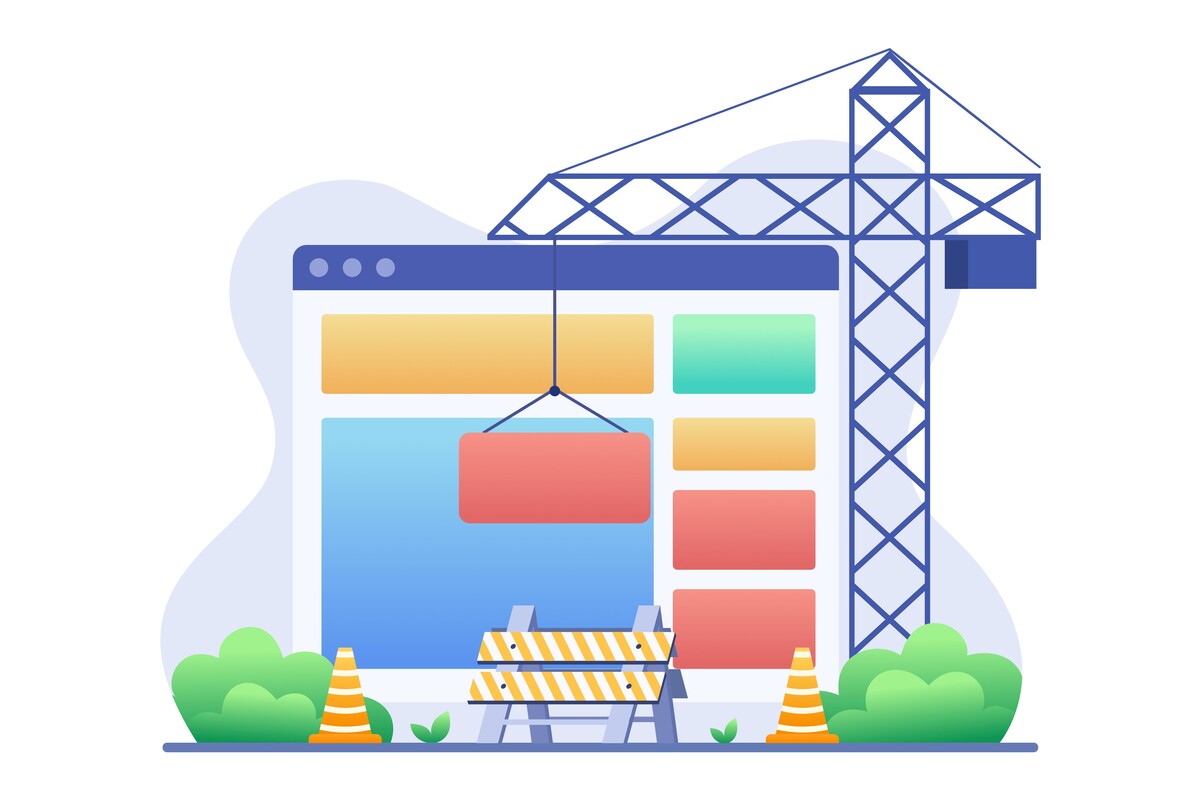Websites are living things that require ongoing maintenance. Our website will start to break down and stop working as well as it should if we don’t take care of it, much like we don’t care for our health.
It is why website upkeep is so crucial. You can keep your website healthy and functioning correctly by constantly upgrading it.
Maintaining a website has various advantages, including:
-
Enhanced safety
For security reasons, updating your website is one of the most crucial things you can do. Website owners must take precautions to safeguard their sites as new security risks materialize.
One of the biggest security dangers for websites is outdated software. You may fix security flaws and keep your website safe from attacks by updating it frequently.
-
Increased effectiveness
Performance improvements are another advantage of website upkeep. Due to accumulating trash files and out-of-date code, websites can become sluggish and slow.
You can ensure your website functions smoothly by frequently cleaning it up and updating your software.
-
Increased search engine visibility
Website freshness is one of the most crucial elements in search engine ranking. It relates to how frequently fresh content is added to your website.
Search engines prefer frequently updated websites, like Google, since they show that the site is still relevant and current. Therefore, website upkeep can raise your search engine ranking.
-
Enhanced client satisfaction
Customers want websites to be user-friendly and current. They might become irritated and do business elsewhere if they encounter out-of-date information or a glitchy interface.
You can ensure your clients have a good time on your website and return often by updating it.
-
Lower costs
Preventing issues is frequently less expensive than fixing them. When it comes to websites, this is especially true.
You’ll eventually have to pay for expensive repairs if you neglect your website and let it deteriorate; however, if you maintain your website.
Benefits for Your Business of Regular Website Maintenance
You are aware that there are a billion and one things to remember to do every day as a business owner. The list includes everything from marketing to employee management to inventory. Letting your website fall by the wayside amid all this can be simple. But for various reasons, maintaining your website is essential to your company’s success.
-
Maintain Your Website’s Content
The initial point of contact between you and your customers is frequently your website. As a result, it’s critical to maintain the accuracy of the content on your website. Your website should reflect any modifications you make to your goods or services frequently. If visitors to your website find out the content needs to be updated, they may decide to go elsewhere.
-
Boost Your Search Engine Positioning
Updating your website might raise it in search engine results is another motivation to do so. Search engines continuously crawl websites in search of fresh content. Regularly adding new content to your website will increase the likelihood that it will appear in search results. It is particularly crucial if you’re seeking to grow your customer base.
-
Quickly address any issues.
Even if your website is well-designed and maintained, problems may inevitably surface occasionally. If you ignore these difficulties, they frustrate your customers or reduce the functionality of your website. Your website can run well, and any problems can be swiftly resolved by maintaining it regularly.
-
Encourage Return Business
Customers are more likely to return to your website in the future if you provide them with a positive online experience. Maintaining your website can ensure it is always quick, responsive, and straightforward. Customers will be encouraged to do so, which could ultimately result in more sales for your company.
-
Spend Less Now to Save More Later
Although website upkeep may seem unnecessary, it might save you money.
Standard website upkeep tasks and why they’re important
Your website needs routine maintenance to operate correctly, just like your car. You should pay attention to your website more than you would fail to rotate the tires or replace the oil on your automobile.
Even if website upkeep is not the most enjoyable chore, it is undoubtedly crucial. You can ensure that your website remains functional and that users have a satisfying experience by updating it.
Still trying to figure out where to begin? Here are three typical website upkeep duties and why they’re essential:
-
Publish New Content
Regularly updating your material is one of the most crucial components of website upkeep. Your information will eventually become stale and inaccurate. Visitors may feel misled or assume you don’t care about keeping your site current, which may be a significant turnoff.
Make it a routine to routinely check your content and change it as necessary to prevent this. It covers all inert material on your website, such as product descriptions, pricing details, and blog posts, in addition to articles and other articles.
-
Maintain Software Updates
Maintaining the latest versions of your software is a crucial aspect of website maintenance. It includes any plugins or themes you may be utilizing and the content management system (CMS) that drives your website.
Security flaws caused by outdated software can make your website vulnerable to attack. Additionally, it might result in compatibility problems, which might result in errors or other issues. For these reasons, ensuring your website’s software is always running at the most recent version is crucial.
-
Check Your Website for Issues
Even if you take all the essential safety measures, issues with your website may still occur. It’s crucial to check your site for any problems periodically.
There are several methods for doing this. Use Google Search Console, which will notify you of any issues with your site’s appearance in search results, as one option. Using an uptime monitoring system is another.
Checklist for Website Maintenance: What to Do and How Often
Similar to your car is your website. To keep it working smoothly, it requires routine maintenance. A well-maintained website will load faster, contain fewer mistakes, and place better in search engine results.
One aspect of website management is the creation and routine updating of content. Your website’s technological efficiency and security need to be monitored as well.
Here is a website upkeep checklist to assist you in keeping your website in top condition.
-
look for broken links on your website.
Links that lead to 404 error pages are considered broken links. Visitors find them annoying, and they may harm your website’s SEO.
Use a crawler like Screaming Frog to look for broken links on your website. Once you’ve located them, change or eliminate the links.
-
Track the uptime of your website.
The percentage of time your website is available to visitors is known as its uptime. Maintenance, traffic peaks, and server problems can all result in downtime.
Keeping track of your website’s uptime is crucial to guarantee that users can always access it. To track the uptime of your website and receive notifications when it is down, use a service like Uptime Robot.
-
Make a website backup
It’s crucial to back up your website in case something goes wrong. You can restore your website from a backup if it gets hacked or if you unintentionally erase something.
Numerous WordPress plugins are available that can automate the backup procedure for you. Because it is simple to use and has a free version, we suggest UpdraftPlus.
-
Always update your WordPress plugins and themes
For optimal performance and security, update your WordPress plugins and themes regularly. Your website may need to be more active and open to hacking if it uses outdated plugins and themes.
Your WordPress dashboard has an update feature for plugins and themes. WordPress will display the plugins and themes that require updating.
-
Keep track of your website’s functionality
It’s crucial to keep track of the performance of your website.
Website Security’s Function in Keeping Your Online Presence Safe
Websites are constantly under assault from hackers and other bad actors that want to access sensitive data by finding flaws and exploiting them. Website security is crucial for defending against these assaults and safeguarding your online presence.
Many various factors affect website security, but some of the most crucial ones are as follows:
- Securing your server and hosting environment
- Maintaining your software and plugins
- Employing two-factor authentication and secure passwords
- Putting in place a security protocol for your website
- Keeping an eye out for harmful activities on your site
These precautions are critical in and of themselves, but when taken together, they provide a robust defense against most threats. By taking precautions to secure your website, you can shield your company from liability in the event of a data breach or other security issue, as well as your clients.

The Value of Changing Content on Your Website and Keeping It Fresh
The majority of companies recognize how crucial having a website is. But many people must know that a website cannot be set and forgotten. Your website must be regularly updated with new material to remain effective.
It is significant for several reasons, including:
-
It Maintains Your Website’s Relevance
Ensure your website has the content your target audience is genuinely interested in if you want it to be relevant to them. It entails consistently releasing new, creative information that will appeal to your readers.
-
Your search engine rankings will improve.
Freshness is a crucial ranking element for Google and other search engines. It means that you must consistently provide new material to your website if you want it to rank highly in search results.
-
It Increases Website Traffic
Give visitors a cause to come to your website if you want them to. It can be accomplished by adding new content. You’ll be more likely to draw new visitors if you regularly publish articles, blog posts, or other material.
-
It maintains the appearance of your website
A well-maintained and frequently updated website is better than one that is not. It is crucial since visitors’ perceptions of your company may be significantly influenced by how your website looks.
-
It Aids in Relationship Development
Give your target audience content that they can use if you want to establish relationships with them. You may position yourself as an authority in your field by consistently posting educational and helpful information.
In conclusion, it’s critical to remember that a website is not static. It must be continuously updated with new content to be effective. It will help you keep your website current, improve search engine results, enhance website traffic, and cultivate relationships with your target market.
How to Prevent Website Downtime and Its Effects on Your Business
In the contemporary business environment, websites are essential. They are both how consumers learn about products and services and how businesses market them. Even a brief website outage can significantly affect a company’s operations.
A website outage may impact a business in various ways:
- It can lead to a decline in sales. The company will miss out on a deal if a customer cannot buy a good or service because the website is down.
- It might affect client satisfaction. Customers may be less likely to do business with the firm again if they cannot acquire a good or service or have a negative experience on the website.
- It might harm the business’s standing.
Customers can believe that a company is unprofessional or doesn’t care about them if its website is down.
Businesses can take a few steps to reduce the likelihood of website outages. Utilizing a website monitoring service is an excellent place to start. These services will notify the business if the website is down so that it may fix the problem as soon as feasible. A content delivery network (CDN) is a second tool for organizations. By caching content and distributing it throughout a network of computers, CDNs can aid in enhancing website speed and availability. A web application firewall (WAF) is a third tool available to enterprises. A WAF can assist in defending a website against assaults and malicious traffic.
A firm may suffer significantly from a website outage. Businesses can aid in preventing downtime and maintaining the functionality of their websites by using a website monitoring service, a CDN, and a WAF.
Cons and Advantages of Hiring a Professional for Regular Website Maintenance
You might discover that, as your company expands, you need more time or expertise to maintain your website current. If so, consider paying a pro to keep your website regularly. You may decide if this is best for you by weighing the benefits and cons listed below.
PROS:
- Save Time: One of the most significant benefits of hiring a professional to maintain your website is that you’ll have more time. You might utilize this time to concentrate on different areas of your company.
- Expertise: Another benefit of hiring a pro is that they will know how to maintain your website’s ideal appearance. They’ll be able to keep your website current with the newest trends and troubleshoot any problems that could crop up.
- Peace of Mind: When you employ a professional to maintain your website, you can relax knowing it is in capable hands. As a result, you won’t have to worry about your website and can instead concentrate on other elements of your organization.
CONS:
- Cost: One of the primary drawbacks of hiring a professional to maintain your website is the expense. Depending on the size of your website and how frequently upgrades are needed, this might be a pricey issue.
- Loss of Control: When you hire a professional to maintain your website, you will give up some control of your website. If you prefer to be active in the daily management of your website, this could be an issue.
- Dependence: Using a professional to maintain your website has the additional drawback of making you dependent on them. It implies that your website won’t be updated if they are not accessible for any reason. If your website requires quick loading times, this can be a problem.
Overall, there are benefits and drawbacks to hiring a pro to maintain your website. You must consider the advantages and disadvantages to determine if this is your best choice.
Key Metrics to Track for Measuring the Success of Your Website Maintenance Efforts
The quality of your website depends on when it was last updated. Even if your website is the most attractive and user-friendly in the world, it will quickly become antiquated, unreliable, and slow if it is not maintained correctly.
Because of this, website maintenance is crucial. It is not sufficient to create a website and then leave it alone. You must frequently check for updates, security holes, and performance problems, then fix them immediately.
But how can you tell if your maintenance efforts have any real impact? What essential metrics ought you to monitor?
The following four metrics are crucial to monitor when evaluating the effectiveness of your website maintenance activities.
-
Timeline
The first and most obvious measure to track is uptime. It’s a gauge of how frequently users can reach your website.
You may track uptime using various technologies, like Pingdom and UptimeRobot. These programs will check your website regularly to make sure it is up and running. You’ll be informed immediately if your website is down, so you can take the necessary steps to fix it.
-
Reaction Time
The time it takes for your website to load is known as the response time. This measure should be monitored because it directly impacts user satisfaction.
You may monitor response time using various technologies, including GTmetrix and Google PageSpeed Insights. These programs will examine your website and suggest how to enhance functionality.
-
Security Weaknesses
An essential component of website maintenance is keeping your website secure. You may track security vulnerabilities using various technologies, like Qualys SSL Labs and Sucuri SiteCheck.
These programs will scan your website for recognized security flaws and make fixes suggested by them.
-
Google Search Console
You may monitor how well your website does in Google searches using Google Search Console, a free service provided by Google.
It is a significant number to monitor since it can help you learn how potential buyers find your website.



